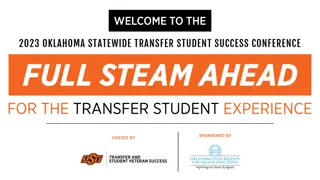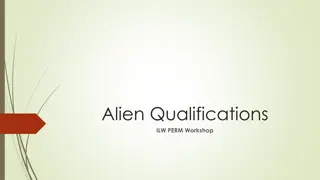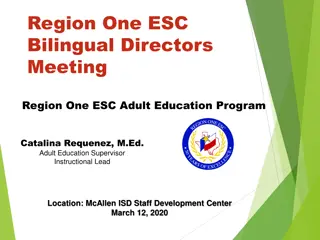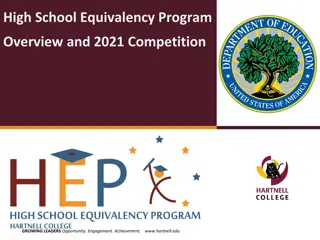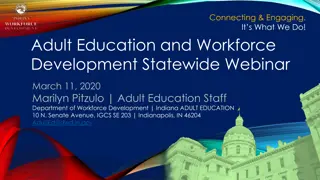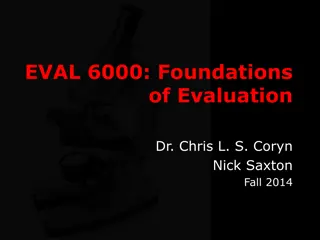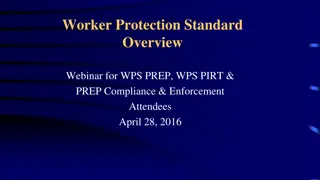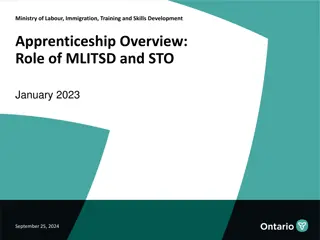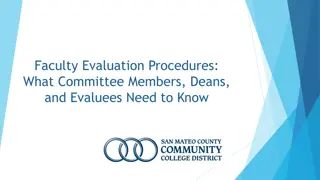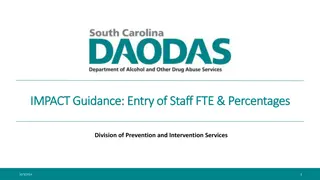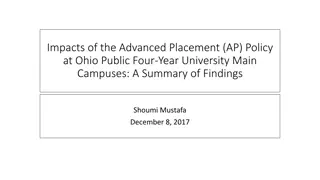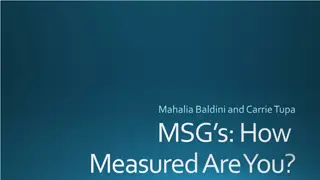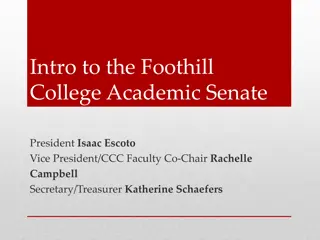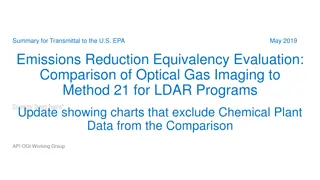Actions Emanating from the Evaluation of the Governance Reform
The evaluation of the governance reform within the WMO aimed to assess its alignment with strategic objectives, effectiveness in responding to societal needs, coordination efficiency, decision-making process, agility, and more. Evaluation criteria included relevance, design validity, effectiveness,
1 views • 13 slides
Course Equivalency Project (CEP)
Database-driven Course Equivalency Project (CEP) in Oklahoma simplifies course transfer and credit recognition between institutions. It offers a comprehensive guide on course equivalencies, student learning outcomes, and institutional obligations, aiming to streamline the academic pathway for studen
0 views • 19 slides
Comprehensive School Quality Assurance and Evaluation Process
A detailed insight into the Quality Assurance Department's role in school evaluation and improvement processes, including Whole School Evaluation (WSE), Follow-through initiatives, Teaching and Learning assessments, Resumption and Examination Monitoring. The process involves both internal self-evalu
0 views • 20 slides
Methods of Training Evaluation: Overview and Importance
Training and development are fast-growing fields globally, including in India. Evaluation plays a crucial role in understanding the effectiveness and efficiency of training programs for human resource development. This presentation covers the concept of training, evaluation strategies, methods/model
0 views • 61 slides
Universal Evaluation Framework: Simplifying Evaluation Processes
This session introduces the Universal Evaluation Framework (UEF) developed for evaluating QAA Scotland Enhancement Themes. Participants learn key evaluation questions, evidence capture, and the Theory of Change to enhance evaluation confidence. The QAA Scotland Evaluation Odyssey details historical
2 views • 14 slides
Implementing Blind Evaluation Pilot in HORIZON EUROPE: Key Facts and Process
HORIZON EUROPE is conducting a pilot on Blind Evaluation in the 2023-2024 work program to address biases in the research and innovation evaluation process. The pilot aims to assess the feasibility of blind evaluations in ensuring fairness and mitigating potential biases towards well-known organizati
9 views • 9 slides
Strengthening National Evaluation Capacity in the Era of Sustainable Development Goals
The presentation by Vijayalakshmi Vadivelu at the National Evaluation Capacities Conference 2017 in Istanbul focused on the importance of strengthening national evaluation capacity in alignment with the Sustainable Development Goals (SDGs). The content covers the holistic approach to national evalua
3 views • 18 slides
Exploring Developmental Evaluation for Better Decision-Making
Delve into the realm of developmental evaluation, focusing on its purpose, principles, and application in practice. Understand how developmental evaluation emphasizes real-time data collection for informed decision-making in complex systems. Learn about key principles such as developmental purpose,
0 views • 25 slides
Understanding Educational Equivalency for Immigration Purposes
The regulations for EB-2 and EB-3 visas require a minimum of a bachelor's degree, but equivalency assessments differ between H-1B and immigrant visa contexts. Educational credentials must often be evaluated by authoritative sources like EDGE to determine if they meet US degree standards. Non-traditi
1 views • 12 slides
Evaluation Practices in Macedonia: What Works, What Doesn't
The comparison between the effectiveness of evaluation practices and the presence of formal institutions in Macedonia raises questions about the impact of institutional design on outcomes. While some countries with robust evaluation institutions fall short in practice, others lacking such structures
1 views • 7 slides
Enhancing Evaluation Capabilities in Mongolia for Agenda 2030
The Mongolian Evaluation Network in collaboration with UNDP is working to integrate the 2030 Agenda into national strategies and plans, establish institutional coordination mechanisms, align budgets, and enhance data monitoring systems. Key stakeholders including government agencies, NGOs, and inter
0 views • 9 slides
Understanding Demi-Regularity in Realist Evaluation
Realist Evaluation is a theory-driven approach focusing on understanding the context and mechanisms of action behind policies and interventions. This webinar explores the concept of demi-regularity in realist evaluation, its origins, and its application in analyzing complex evidence. Key aspects cov
1 views • 16 slides
Understanding Evaluation in Education
Evaluation in education is a comprehensive term that encompasses measurement, testing, and qualitative examination of student behavior. It involves both quantitative and qualitative descriptions, along with value judgments. Differentiating from mere measurement, evaluation provides a deeper analysis
0 views • 28 slides
Region One ESC Bilingual Directors Meeting - Strengthening Community Engagement
Region One ESC hosted a Bilingual Directors Meeting focused on strengthening family and community engagement in adult education programs. The meeting highlighted the connection between Title III, Part A programs and various resources available to support students in achieving their education and car
2 views • 9 slides
Sustainable Evaluation Systems Workshop Summary
Workshop on Sustainable Evaluation Systems by Stephen Porter at the NEC Conference focused on defining evaluation systems, addressing their failures, and emphasizing the importance of quality, use, and networks in achieving sustainability. Participants engaged in activities such as bingo card introd
0 views • 38 slides
Strategic Management: Strategy Review and Evaluation
This chapter delves into the critical process of strategy review, evaluation, and control in strategic management. It covers the nature of strategy evaluation, effective evaluation systems, contingency planning, auditing, using computers for evaluation, and guidelines for effective strategic managem
1 views • 42 slides
Updates on USCG PFD Standards and Regulations
Kurt Heinz from the U.S. Coast Guard's Lifesaving & Fire Safety Division provides details on Resolution 2009-83-1 and the ongoing efforts to modernize quality assurance and transition to North American standards. The content covers the required specifications for USCG-approved PFDs, the development
0 views • 20 slides
Understanding Evaluation and Ideology in Translation
Evaluation plays a crucial role in the study of translation, influencing both meaning and value in communication. This evaluation is reflected through language elements like accentuation, deletion, and substitution. Appraisal, stance, and evaluation are key terms in linguistic analysis that focus on
2 views • 22 slides
Impact and Evaluation Toolkit for Churches and Christian Charities
This toolkit aims to equip churches and Christian charities engaged in small-scale social action projects to think about impact, measure impact, choose data tools, reflect on evaluation data, and use it effectively. It covers principles of evaluation, setting objectives, selecting indicators, storyt
0 views • 34 slides
Evaluation Metrics for IEEE 802.11-14/0107 HEW Proposal
Evaluation metrics play a crucial role in assessing WLAN system performance and achieving the objectives of High Efficiency WLAN (HEW). This proposal by Yonggang Fang et al. from ZTE outlines the key evaluation metrics recommended for evaluating HEW performance, including area throughput, average th
0 views • 12 slides
Overview of Monitoring and Evaluation in the GEF
The Evaluation in the GEF and Training Module focuses on promoting accountability and learning within the Global Environment Facility (GEF) through monitoring and evaluation activities. The GEF Independent Evaluation Office plays a crucial role in assessing results, effectiveness, and performance of
0 views • 25 slides
Overview of Transfer with Success Act and Regulatory Changes in Maryland
The Transfer with Success Act, passed in 2021, introduced new requirements for public institutions in Maryland related to credit transfers between institutions. Recent stakeholder work groups and regulatory changes have paved the way for implementing these new regulations, aiming to facilitate smoot
0 views • 23 slides
Chile Country Portfolio Evaluation 2010-2014 Summary
Evaluation process of Chile's country portfolio from 2010-2014 included pre-evaluation, during evaluation, and results/conclusions phases. Challenges like defining scope and participant concerns were addressed. Preliminary conclusions were presented to stakeholders, leading to a trustful and represe
1 views • 6 slides
Potential Amendments for Reforming REACH Evaluation Process
Discussion at the Ad-hoc Meeting of Competent Authorities for REACH and CLP focused on potential options for amending the REACH Regulation to reform the evaluation process. Topics included registration-related measures, substance evaluation, testing proposals, compliance checks, and expectations dur
0 views • 30 slides
Developing an Evaluation Work Plan for Effective Program Assessment
This presentation by Amy D. Andrade from San Jose State University focuses on developing an Evaluation Work Plan to identify responsibilities and timelines. It covers topics such as Evaluation Coaching Support, Webinar Outlines, Logic Model, Inputs-Outputs-Outcomes, Two Approaches to Evaluation, Pro
0 views • 29 slides
Empowering Agricultural Workers: HEP High School Equivalency Program Overview 2021
HEP, funded by a grant from the Department of Education, helps agricultural workers and their families achieve high school equivalency and pursue postsecondary training or better employment opportunities. Hartnell College's HEP program in California has been successfully meeting and exceeding perfor
0 views • 12 slides
Empowering Adults Through Education and Workforce Development in Indiana
Marilyn Pitzulo from the Department of Workforce Development in Indiana presented a Statewide Webinar on March 11, 2020, highlighting the importance of adult education and workforce development. The webinar showcased success stories like Lucille Rudolph, a 100-year-old recipient of an honorary high
0 views • 70 slides
Foundations of Evaluation - Conference Experience and Approaches
The Foundations of Evaluation course covers diverse topics such as improvement- and accountability-oriented evaluation approaches, social agenda evaluation, and eclectic approaches. The course material includes insights on decision- and accountability-oriented studies, methods for program improvemen
0 views • 29 slides
Evaluation Synthesis in Changing Contexts: Enhancing Knowledge for Development Effectiveness
Evaluation synthesis is crucial for promoting learning, reflection, and decision-making in development work. This process involves bringing together diverse knowledge sources to generate strategic insights and facilitate wider use of evaluation findings. The Independent Office of Evaluation of IFAD
0 views • 20 slides
Worker Protection Standard Overview Webinar for WPS Compliance
Delve into the Worker Protection Standard (WPS) framework, revised rules, exemptions, and more in this comprehensive webinar tailored for WPS PREP, PIRT, and PREP Compliance and Enforcement attendees. Explore key aspects such as WPS basics, relationship with OSHA regulations, training requirements,
0 views • 120 slides
Evaluation of FME Zero Emission Neighbourhoods in Smart Cities
The mid-term evaluation process of FME Zero Emission Neighbourhoods in Smart Cities involves self-evaluation, partner evaluation, and panel evaluation. The procedure includes scientific review, evaluation by scholars, and innovation assessment. Key documents like self-reports, progress reports, and
1 views • 20 slides
Ministry of Labour, Immigration, Training, and Skills Development Apprenticeship Overview
Ministry of Labour, Immigration, Training, and Skills Development established Skilled Trades Ontario (STO) to simplify and transform the skilled trades and apprenticeship system in Ontario. The process involves three phases: STO transition, planning for a mature state, and implementation of a mature
0 views • 6 slides
Overview of Regular Evaluation 2017 Findings in Estonia
In the Regular Evaluation 2017, efforts were made to maximize the benefits of evaluation outcomes for various stakeholders in Estonia such as the state, society, and institutions. The evaluation focused on a range of actions including preparing legislation, finding experts, creating self-report form
0 views • 6 slides
Faculty Evaluation Procedures: Committee Structures and Purpose Overview
This slide deck provides information on faculty evaluation procedures, emphasizing the purpose of the evaluation process in supporting faculty development, ensuring student access to quality education, and upholding academic freedom. It also details the committee structures for comprehensive tenured
0 views • 19 slides
Comprehensive Guide to Training Evaluation Methods
This detailed guide covers the aim of evaluation, evaluation methods, techniques of evaluation, types of evaluation (formative, process, outcome, impact), and the significance of formative and process evaluation in assessing training effectiveness. Learn about the key principles and practices involv
0 views • 45 slides
Guidance on Staff FTE Entry for Prevention Services
Providing foundational technical assistance to county authority prevention departments in utilizing best practices for managing staff lists in IMPACT. The goal is to enhance professionalism in the prevention field by ensuring accurate reporting and monitoring of services provided by staff members. T
0 views • 31 slides
Impacts of Advanced Placement (AP) Policy at Ohio Public Universities
The study examines the impacts of the AP policy at Ohio public four-year university main campuses. Annual data comparisons show no significant effects on academic outcomes, indicating equivalency between AP credits and on-campus courses. The policy, implemented in 2009, guarantees college credit for
0 views • 23 slides
Review of Measurable Skill Gains in Education Programs
This content provides a detailed review of Measurable Skill Gains (MSGs) in education programs, covering aspects such as skill gains, high school equivalency achievement, postsecondary progression, and workforce training. It also clarifies criteria for basic education gains under WIOA and discusses
0 views • 19 slides
Overview of Academic Senate Roles and Responsibilities at Foothill College
Foothill College's Academic Senate, led by President Isaac Escoto, Vice President Rachelle Campbell, and Secretary/Treasurer Katherine Schaefers, plays a crucial role in academic and professional matters. As outlined by Title 5 and Ed Code, the Senate is responsible for curriculum development, degre
0 views • 17 slides
Emissions Reduction Equivalency Evaluation: OGI vs. Method 21 Update
May 2019 update presents data comparison of Optical Gas Imaging (OGI) and Method 21 for LDAR programs, excluding Chemical Plant data. Results show the impact of including Refinery, Gas Plant, and Chemical Plant data versus only Refinery and Gas Plant data, revealing varying leak rate reductions. Cha
0 views • 13 slides

